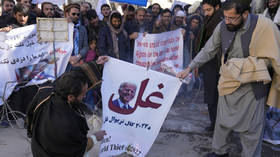US refuses to unfreeze Afghan funds – media

US President Joe Biden’s administration has reportedly opted against releasing $7 billion in Afghan Central Bank assets, deciding to keep the funds frozen due to concern that the currently Taliban-ruled country is again harboring international terrorists.
Washington also has suspended talks with the Taliban after previously seeing progress in the negotiations, the Wall Street Journal reported on Monday, citing US officials. The decision concerns the war-torn country’s US-based assets, which Biden’s administration froze after last year’s Taliban takeover of Afghanistan.
The refusal to release the funds “deals a blow to the hopes of an economic recovery in Afghanistan as millions face starvation” one year into the Taliban’s rule, the WSJ said. Just last week, a group of 70 prominent economists and academics from the US, UK and five other countries issued an open letter calling for Washington to release the assets, citing the “economic and humanitarian catastrophes unfolding in Afghanistan” and the role that America played in “driving” those crises.
“We do not see recapitalization of the Afghan Central Bank as a near-term option,” Thomas West, the US State Department’s special representative for Afghanistan, told the WSJ. “We do not have confidence that that institution has the safeguards and monitoring in place to manage assets responsibly.”
The presence of Al Qaeda leader Ayman al-Zawahiri, whom US forces killed late last month in a drone strike in Kabul, helped seal the fate of the Afghan assets. The fact that the high-level terrorist was apparently comfortable traveling to Afghanistan’s capital heightened Washington’s fears that the Taliban’s return to power has allowed Al Qaeda and other terrorist groups to regroup in the country, setting the stage for more overseas attacks.
“Needless to say, the Taliban's sheltering of Al Qaeda leader Ayman al-Zawahiri reinforces deep concerns we have regarding diversion of funds to terrorist groups,” West said.
Most of the Afghan Central Bank’s nearly $10 billion in assets were frozen overseas after the Taliban seized control of the country a year ago. The US controls the lion’s share of those funds, about $7 billion, and had been negotiating with the Taliban for the release of about $3.5 billion for humanitarian aid in Afghanistan. Biden signed an order in February to earmark the remaining $3.5 billion as a fund for victims of the September 11, 2001, terrorist attacks.













